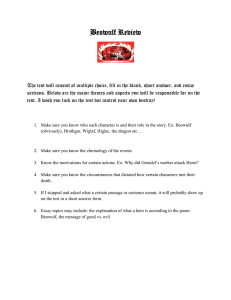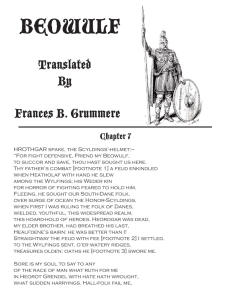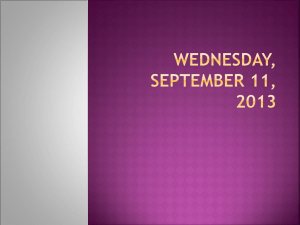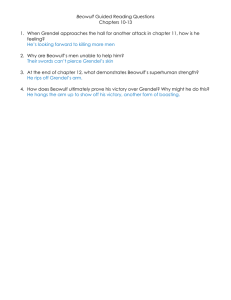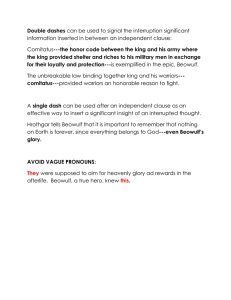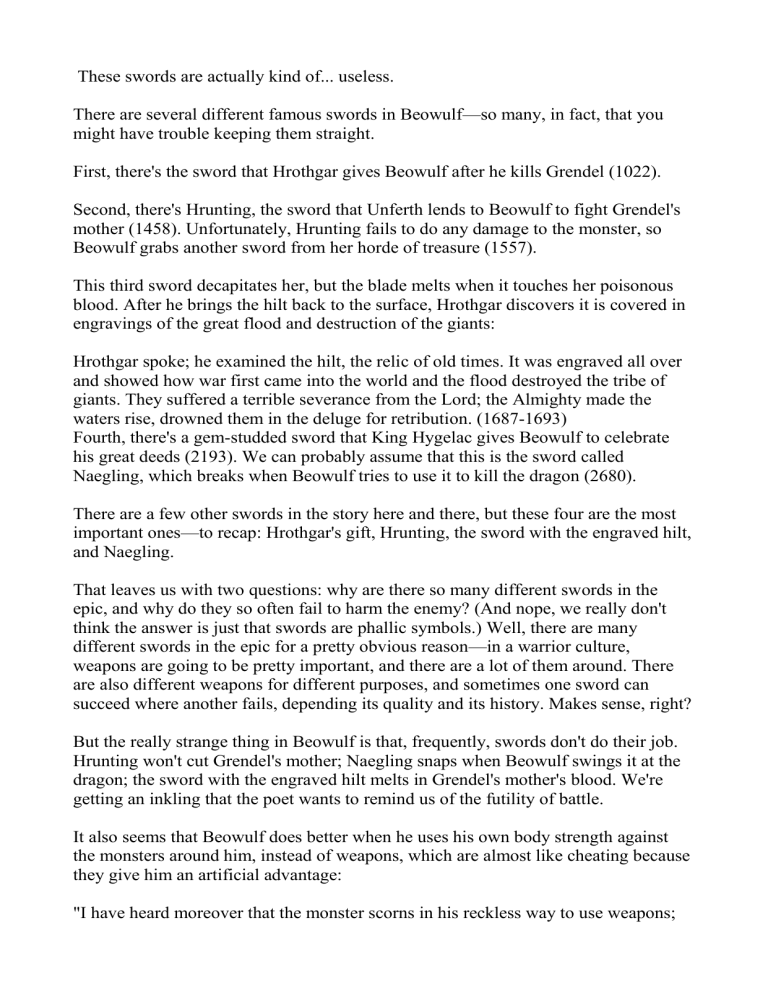
These swords are actually kind of... useless. There are several different famous swords in Beowulf—so many, in fact, that you might have trouble keeping them straight. First, there's the sword that Hrothgar gives Beowulf after he kills Grendel (1022). Second, there's Hrunting, the sword that Unferth lends to Beowulf to fight Grendel's mother (1458). Unfortunately, Hrunting fails to do any damage to the monster, so Beowulf grabs another sword from her horde of treasure (1557). This third sword decapitates her, but the blade melts when it touches her poisonous blood. After he brings the hilt back to the surface, Hrothgar discovers it is covered in engravings of the great flood and destruction of the giants: Hrothgar spoke; he examined the hilt, the relic of old times. It was engraved all over and showed how war first came into the world and the flood destroyed the tribe of giants. They suffered a terrible severance from the Lord; the Almighty made the waters rise, drowned them in the deluge for retribution. (1687-1693) Fourth, there's a gem-studded sword that King Hygelac gives Beowulf to celebrate his great deeds (2193). We can probably assume that this is the sword called Naegling, which breaks when Beowulf tries to use it to kill the dragon (2680). There are a few other swords in the story here and there, but these four are the most important ones—to recap: Hrothgar's gift, Hrunting, the sword with the engraved hilt, and Naegling. That leaves us with two questions: why are there so many different swords in the epic, and why do they so often fail to harm the enemy? (And nope, we really don't think the answer is just that swords are phallic symbols.) Well, there are many different swords in the epic for a pretty obvious reason—in a warrior culture, weapons are going to be pretty important, and there are a lot of them around. There are also different weapons for different purposes, and sometimes one sword can succeed where another fails, depending its quality and its history. Makes sense, right? But the really strange thing in Beowulf is that, frequently, swords don't do their job. Hrunting won't cut Grendel's mother; Naegling snaps when Beowulf swings it at the dragon; the sword with the engraved hilt melts in Grendel's mother's blood. We're getting an inkling that the poet wants to remind us of the futility of battle. It also seems that Beowulf does better when he uses his own body strength against the monsters around him, instead of weapons, which are almost like cheating because they give him an artificial advantage: "I have heard moreover that the monster scorns in his reckless way to use weapons; therefore, to heighten Hygelac's fame and gladden his heart, I hereby renounce sword and the shelter of the broad shield, the heavy war-board: hand-to-hand is how it will be, a life-and-death fight with the fiend." (433-440) Alternatively, at one point, the narrator suggests that Beowulf is so strong that his mighty strokes break blades in half, so perhaps Beowulf's heroism is greater than mere weapons could make it. Heorot and Mead-Halls The mead-hall is the symbol of a society: it is in this central place that the people gather to feast, socialize, and listen to the scop (bard) perform and thereby preserve the history of the people. Heorot, as the largest mead-hall in the world, symbolized the might and power of the Spear-Danes under Hrothgar. Heorot A literary symbol is something, often an object, that stands for a significant concept or series of ideas. Often a symbol is emblematic of the values of the characters. In Beowulf, some of the most important symbols are Hrothgar's mead-hall, Grendel's cave, Grendel's arm and head, and the dragon's treasure-trove. Hrothgar's great mead-hall, Heorot ("Hall of the Hart"), functions as both setting and symbol in the epic. It is much more than a place to drink. Symbolically, Heorot represents the achievements of the Scyldings, specifically Hrothgar, and their level of civilization. The hall is a home for the warriors who sleep there and functions as a seat of government. It is a place of light, warmth, and joy, contrasting with Grendel's morbid swamp as well as the dark and cold of winters in Scandinavia. In Heorot, Hrothgar celebrates his victories and rewards his thanes (warriors) with various treasures. The building is like a palace. It towers high and is compared to a cliff. The gables are shaped like horns of the hart. People from neighboring tribes have respectfully contributed to the rich decorations and intricate designs. The hall is also symbolic in that it is the setting of Beowulf's first great battle, the defeat of Grendel. When Grendel invades the hall, he knows that he strikes at the very heart of the Scyldings. That lends special meaning to his victories and to Beowulf's eventual liberation of the hall from the ravages of the ogres. Gold, Treasure, and Gifts In Beowulf, gold, treasure, and gifts are less important for their economic value than their social value. In fact, gold can be seen as a symbol of social interaction: a lord rewards loyalty with gold, and in doing so inspires further loyalty. The transfer of the gold is also a kind of physical embodiment of the lord's duty to nurture his people. Gold can also act as a symbol of regret or a desire for peace: one way of avoiding a feud is to pay the wergild, the man-price, by compensating the family of the injured person with gold, to avoid more violent vengeance. Gold, Treasure, and Gifts Quotes in Beowulf The Beowulf quotes below all refer to the symbol of Gold, Treasure, and Gifts. For each quote, you can also see the other characters and themes related to it (each theme is indicated by its own dot and icon, like this one: Family and Tribe Theme Icon ). Note: all page numbers and citation info for the quotes below refer to the Signet Classics edition of Beowulf published in 2008. Dragon A fire-breathing dragon who discovered a lost tribe's treasure and moved into the barrow housing the gold. The dragon is exceedingly greedy – marking a stark contrast to good kings, who create loyalty and love among their people and warriors through generosity. After a thief steals from the dragon's horde, the dragon goes on a rampage and terrorizes the Geats. Beowulf, the king of the Geats, fights the dragon. Beowulf ultimately kills the dragon, but at the cost of his own life. The threat posed by the dragon therefore represents a kind of tension in the question of what makes a good king. Was Beowulf right to act as a warrior and kill the dragon and protect his people, even if that action resulted in Beowulf's death, since the loss of their king is likely to result in the destruction of the Geats? Or was Beowulf too rash, and should he have waited for a hero just as Hrothgar did when Grendel attacked the Danes?
